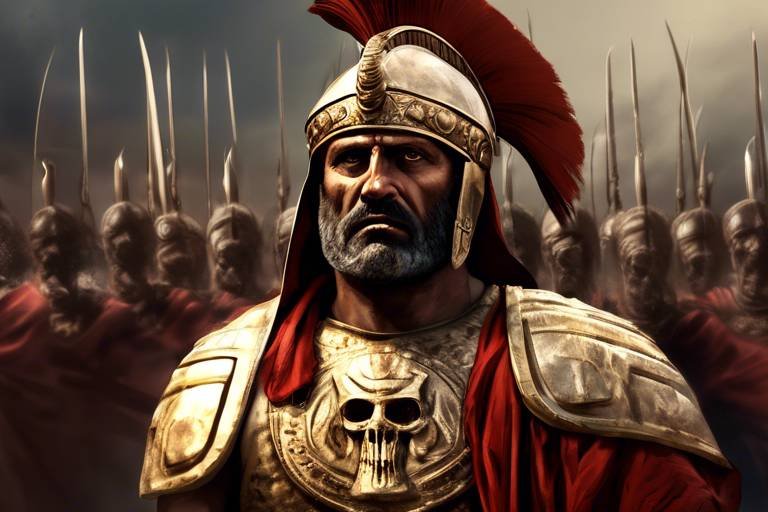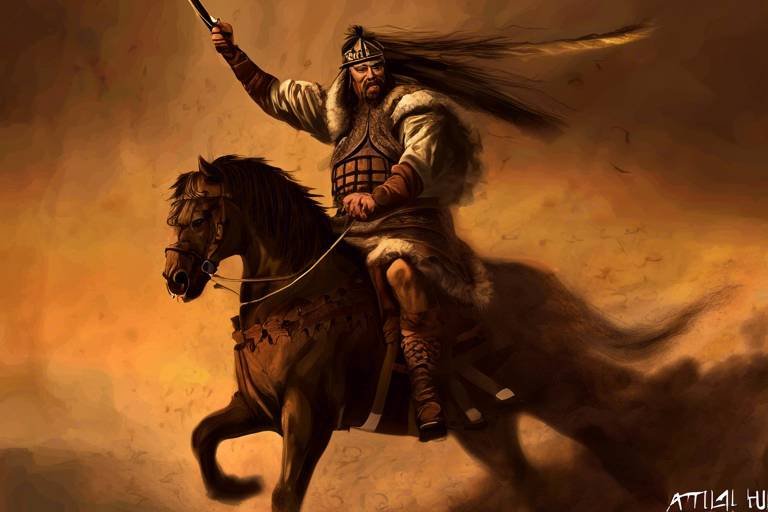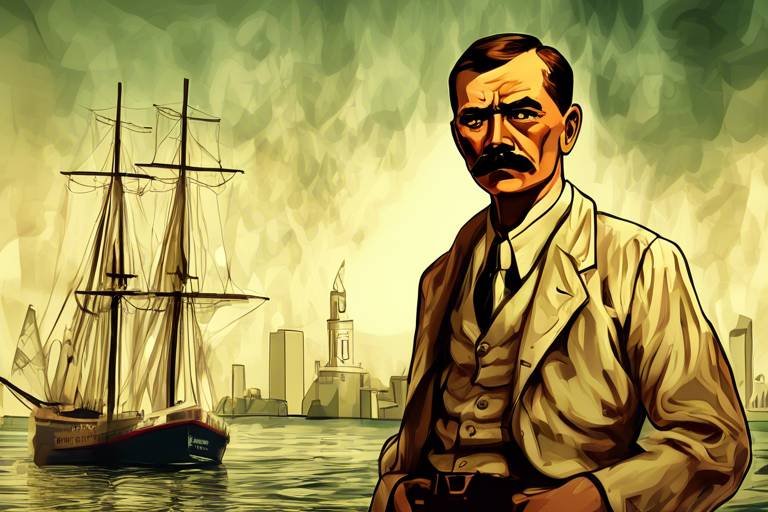Alaric: The King Who Sacked Rome
Alaric, the King Who Sacked Rome, stands as a monumental figure in the annals of history, a name that evokes both awe and dread. His story is one of ambition, conflict, and the dramatic downfall of an empire. Born into a world of turmoil and shifting allegiances, Alaric's journey to power was fraught with challenges and victories that would shape the course of civilizations.
From his humble beginnings, Alaric rose through the ranks of the Visigoths, a tribe on the fringes of the Roman Empire. His leadership qualities and strategic acumen soon caught the attention of friend and foe alike, paving the way for his eventual ascension to the throne. With a keen eye for opportunity and a fierce determination, Alaric carved a path to power that would lead him to the gates of Rome.
The clash between Alaric and Rome was inevitable, a collision of two worlds on a collision course. His campaigns against the mighty empire were marked by daring sieges and calculated maneuvers that kept the Roman legions on edge. But it was his fateful sack of Rome in 410 AD that would reverberate through the ages, a moment of triumph and tragedy that shook the foundations of the known world.
The siege of Rome itself was a masterstroke of military strategy, a testament to Alaric's tactical genius and unwavering resolve. As the Eternal City fell to his forces, the world watched in shock and disbelief, witnessing the unthinkable as the heart of the empire crumbled before their eyes. The repercussions of this historic event would echo far beyond the city walls, reshaping the destiny of nations and empires.
Alaric's conquest left a profound impact on the Roman Empire, triggering a chain reaction of political upheaval and social unrest. The once-mighty empire found itself reeling from the blow, struggling to come to terms with the reality of its vulnerability. Alaric's actions had set in motion a series of events that would ultimately seal the fate of the Western Roman Empire.
The legacy of Alaric endures to this day, a complex tapestry of triumph and tragedy woven into the fabric of history. His reign and actions have been the subject of much debate and interpretation, with scholars and historians seeking to unravel the mysteries of his enigmatic persona. From the barbarian invasions that heralded the empire's decline to the cultural impact of his sack of Rome, Alaric's shadow looms large over the pages of history.
As we reflect on the life and times of Alaric, we are reminded of the fleeting nature of power and the inexorable march of time. His story serves as a cautionary tale, a reminder of the fragility of empires and the impermanence of glory. In the end, Alaric stands as a symbol of both the heights of ambition and the depths of despair, a figure whose name will forever be synonymous with the fall of Rome.
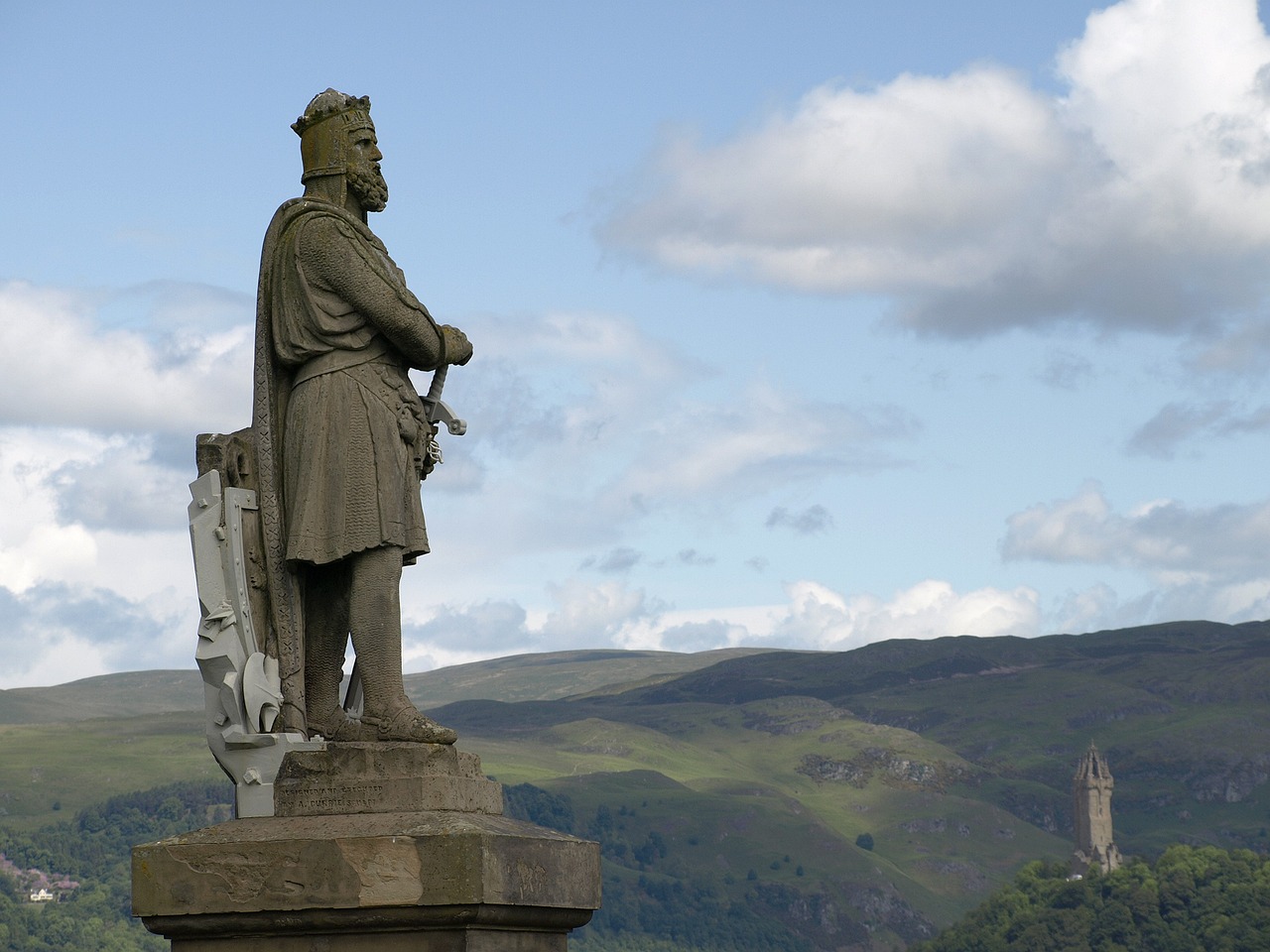
Early Life and Rise to Power
Alaric, the Visigothic king known for his audacious conquests and pivotal role in the fall of the Roman Empire, left an indelible mark on history through his daring exploits. From his humble beginnings to the dramatic siege of Rome, Alaric's life is a saga of ambition, conflict, and legacy.
Alaric's journey to becoming a formidable ruler began in the tumultuous times of the 4th century. Born into the Visigothic tribe, a group of Germanic peoples, in the early 370s, Alaric experienced the chaos and upheaval of his era from a young age. As he navigated the shifting alliances and power struggles of the time, Alaric honed his military skills and leadership acumen, laying the groundwork for his future ascent to the throne.
With a keen understanding of the political landscape and a fierce determination to carve out his place in history, Alaric emerged as a prominent figure within the Visigothic hierarchy. Through a series of strategic maneuvers and alliances, he steadily rose through the ranks, earning the respect and loyalty of his followers along the way.
As the Visigoths faced internal strife and external threats, Alaric's charisma and tactical brilliance shone brightly, propelling him to the pinnacle of power. In 395 AD, following the death of the Visigothic king, Alaric seized the opportunity to claim the throne, cementing his position as the leader of his people and embarking on a path that would forever alter the course of history.

Conflict with Rome
Alaric, the King of the Visigoths, is renowned for his conflict with the mighty Roman Empire, a clash that reverberated through the annals of history. His relentless campaigns against Rome marked a tumultuous period of warfare and upheaval, culminating in the dramatic sacking of the Eternal City in 410 AD. Alaric's audacious actions and strategic prowess shook the foundations of the Roman Empire, leaving a lasting impact on the course of Western civilization.

Siege of Rome
The Siege of Rome led by Alaric, the King of the Visigoths, marked a significant turning point in the history of the Roman Empire. In 410 AD, Alaric's forces surrounded the Eternal City, creating a sense of fear and anticipation among the Roman citizens. The siege was not just a military confrontation but a clash of civilizations, with the Visigoths challenging the might of Rome itself.
Alaric's strategic prowess became evident as he cut off the vital supply routes to Rome, gradually tightening the noose around the city. The Roman defenders, though valiant, were unable to withstand the relentless pressure exerted by the Visigoths. As weeks turned into months, the situation inside Rome grew dire, with food shortages and internal discord adding to the chaos.
Despite facing staunch resistance, Alaric's forces persevered, utilizing innovative tactics to breach the formidable walls of Rome. The Visigoths' determination and Alaric's leadership instilled a sense of inevitability in the outcome of the siege. The fall of Rome seemed imminent, sending shockwaves throughout the empire and beyond.
When the Visigoths finally breached the walls and entered Rome, the city experienced a wave of upheaval and destruction. The once-mighty capital of the Roman Empire was now at the mercy of Alaric and his warriors, who plundered and pillaged with impunity. The sack of Rome by the Visigoths left an indelible mark on the collective memory of the Roman people and reverberated across the known world.

Impact on the Roman Empire
Alaric's conquest of Rome sent shockwaves throughout the Roman Empire, leaving a lasting impact on its political and social fabric. The sack of Rome in 410 AD marked a significant turning point in the history of the empire, signaling the decline of Roman power and the rise of barbarian influence.
The invasion by Alaric and his Visigoths not only devastated the city of Rome but also exposed the vulnerabilities of the once-mighty empire. The event served as a stark reminder of the changing dynamics in the Mediterranean world, where barbarian tribes were increasingly asserting their presence and challenging Roman authority.
Following the sack of Rome, the Roman Empire faced a period of turmoil and instability. The loss of the Eternal City dealt a severe blow to the prestige and morale of the Roman people, leading to a sense of insecurity and fear across the empire. The event also highlighted the inability of the Roman government to protect its most prized possessions from external threats.
Moreover, Alaric's conquest of Rome had far-reaching consequences for the political structure of the empire. It exposed the deep-seated weaknesses and divisions within the Roman state, paving the way for further incursions by other barbarian tribes and ultimately contributing to the eventual fall of the Western Roman Empire.
The aftermath of Alaric's invasion also had profound cultural implications for the Roman Empire. The sack of Rome was a symbolic moment that shattered the aura of invincibility surrounding the city and its rulers. The event left a lasting imprint on the collective memory of the Roman people, shaping their perceptions of power, security, and identity.
Overall, Alaric's impact on the Roman Empire was profound and multifaceted, ushering in a new era of uncertainty and transformation that would ultimately redefine the course of Western civilization.

Political Fallout
After Alaric's successful sack of Rome in 410 AD, the political fallout reverberated throughout the Roman Empire, reshaping the power dynamics and setting the stage for further upheaval. The capture of the Eternal City by the Visigoths under Alaric's command sent shockwaves through the political circles of the empire, highlighting the vulnerabilities and weaknesses that had been festering for years.
One of the immediate consequences of Alaric's actions was the weakening of the Roman leadership's authority and credibility. The inability of the Roman authorities to protect their capital from a barbarian invasion exposed the fragility of the empire's defenses and eroded the confidence of the populace in their rulers. This loss of faith in the central government paved the way for increased regional autonomy and the rise of local strongmen who sought to fill the power vacuum left in the wake of Rome's humiliation.
Furthermore, Alaric's sack of Rome had profound implications for the balance of power within the Roman Empire. The traditional hierarchy and established order were disrupted as the Visigoths, previously considered outsiders and barbarians, now held sway over one of the most prestigious cities in the world. This shift in power dynamics challenged the existing political structures and forced a reevaluation of alliances and loyalties among the various factions vying for control.
The political fallout from Alaric's conquest also extended beyond the borders of the Roman Empire, influencing the relationships between Rome and other neighboring kingdoms and tribes. The boldness and success of Alaric's campaign inspired other barbarian groups to launch their own incursions into Roman territory, further destabilizing the already weakened empire and hastening its eventual decline.
In conclusion, the political fallout from Alaric's sack of Rome was far-reaching and profound, marking a turning point in the history of the Roman Empire and setting the stage for the tumultuous events that would follow in the centuries to come.

Legacy and Historical Significance
Alaric, the King who famously sacked Rome, left behind a legacy that reverberated through the annals of history. His conquest of the Eternal City in 410 AD marked a turning point in the decline of the Western Roman Empire, symbolizing the shifting tides of power and the rise of the barbarian tribes.
Alaric's audacious raid on Rome not only shook the foundations of the once-mighty empire but also served as a stark reminder of the vulnerability of even the most powerful civilizations. The sack of Rome by the Visigoths under Alaric's command sent shockwaves across the known world, forever altering the course of history.
Despite his status as a conqueror, Alaric's reign was not solely defined by destruction. His actions catalyzed a series of events that would ultimately lead to the fall of the Western Roman Empire, paving the way for the emergence of new powers and the reshaping of the geopolitical landscape in Europe.
Alaric's legacy extends beyond his military exploits, encompassing the cultural impact of his conquest. The sack of Rome by the Visigoths inspired a wealth of artistic interpretations, literary works, and historical narratives that continue to captivate audiences to this day.
Furthermore, Alaric's role in the larger tapestry of barbarian invasions during the decline of the Roman Empire solidifies his place in history as a pivotal figure in the transition from antiquity to the medieval period. His actions set in motion a chain of events that would shape the course of European history for centuries to come.

Barbarian Invasions
During the tumultuous era of Alaric's reign, the played a pivotal role in shaping the fate of the Western Roman Empire. These invasions were not merely isolated events but rather a culmination of various tribes and peoples making incursions into Roman territories, seeking conquest and plunder.
Alaric's conquest of Rome served as a stark symbol of the larger trend of that plagued the weakening Roman Empire. The Visigoths, under Alaric's leadership, were just one of many groups that capitalized on the Empire's vulnerabilities to assert their dominance and carve out their own territories.
These were not only military conflicts but also cultural clashes that accelerated the decline of Roman authority in the West. The influx of various tribes brought different customs, languages, and traditions, further fragmenting the once-mighty Roman Empire.
As the Roman Empire struggled to repel these , the internal divisions and political instability within the Empire only served to embolden the invaders. Alaric's successful sack of Rome in 410 AD was a stark reminder of the Empire's vulnerability and marked a turning point in the history of the Western Roman Empire.
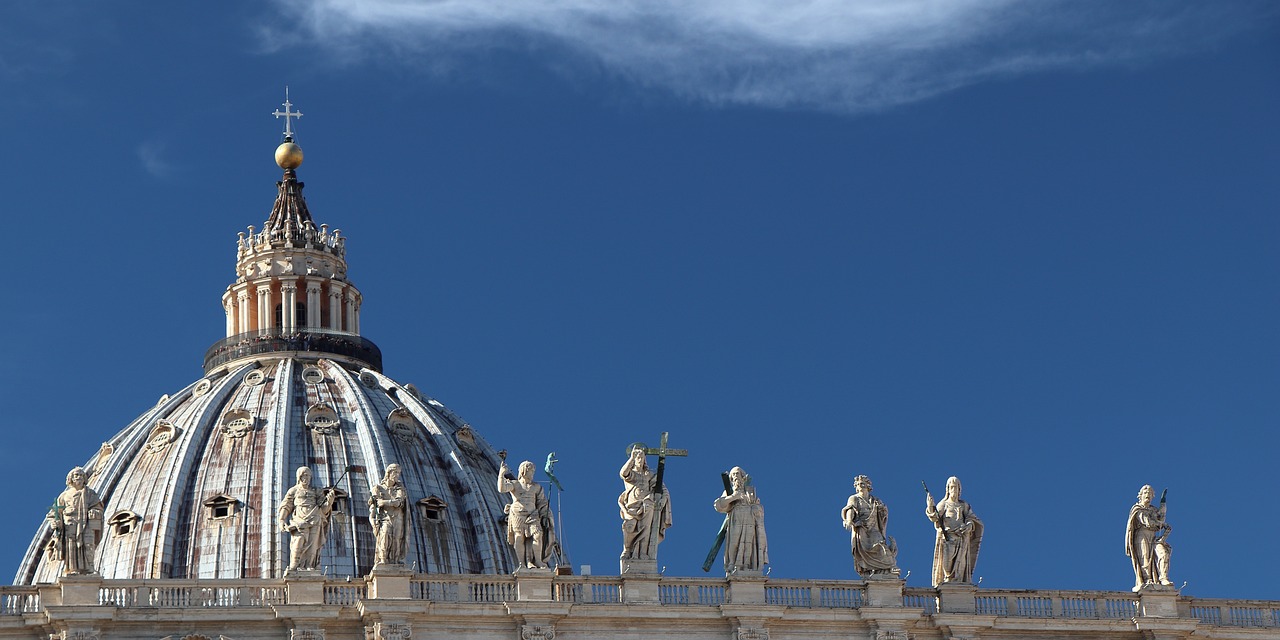
Cultural Impact
Alaric's sack of Rome in 410 AD had a profound that reverberated through the centuries. The fall of the Eternal City at the hands of the Visigoths sent shockwaves across the Roman Empire and beyond. This event marked the first time in nearly 800 years that Rome had been captured by an enemy force, signaling the decline of Roman power and the rise of barbarian influence in Europe.
The of Alaric's conquest extended far beyond the borders of the Roman Empire. The sack of Rome inspired fear and awe among contemporaries, shaping perceptions of the barbarian threat and the vulnerability of once-mighty civilizations. Artists, writers, and historians have long been fascinated by the dramatic events surrounding Alaric's siege, immortalizing the king and his actions in various forms of art and literature.
Alaric's sack of Rome has been depicted in countless works of art, literature, and popular culture, capturing the imagination of audiences worldwide. From epic poems to historical novels, the story of Alaric and the fall of Rome has been retold and reimagined in myriad ways. These cultural representations not only serve as a reminder of the past but also shed light on the enduring legacy of Alaric and his impact on Western civilization.
Frequently Asked Questions
- Who was Alaric?
Alaric was a prominent leader of the Visigoths, a Germanic tribe that played a significant role in the downfall of the Western Roman Empire. He is best known for his sack of Rome in 410 AD.
- What led to Alaric becoming the King of the Visigoths?
Alaric's rise to power was a result of his military prowess and leadership skills. He emerged as a key figure during a tumultuous period in European history, leading the Visigoths through various military campaigns and ultimately becoming their king.
- How did Alaric's siege of Rome impact the Roman Empire?
Alaric's sack of Rome had far-reaching consequences for the Roman Empire. It marked a symbolic turning point in the decline of Roman power and prestige, signaling the vulnerability of the once-mighty empire to external threats.
- What was the legacy of Alaric's conquest?
Alaric's conquest of Rome left a lasting legacy in history, contributing to the eventual fall of the Western Roman Empire and reshaping the political and cultural landscape of Europe. His actions symbolized the broader trend of barbarian invasions that characterized the period.



